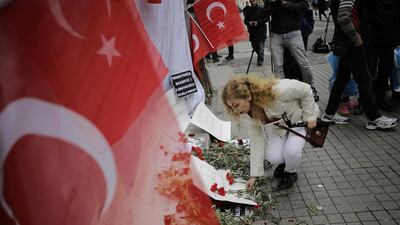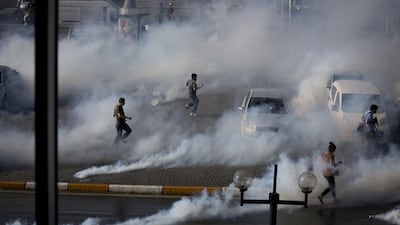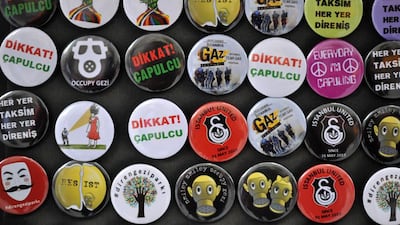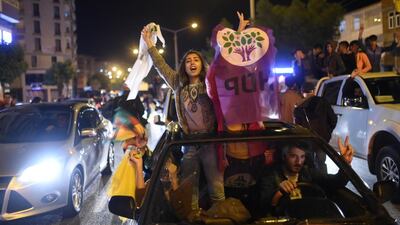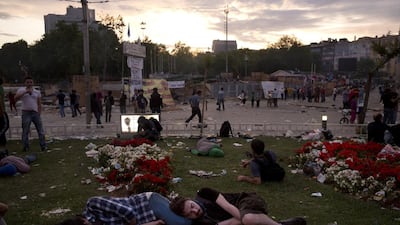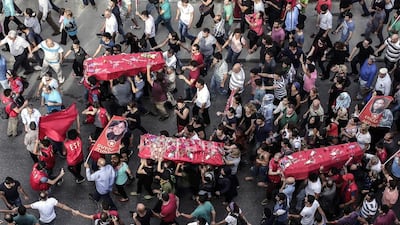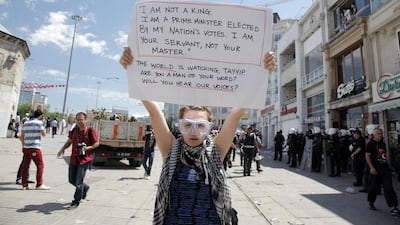In the arid hills of south-eastern Turkey, an increasingly bloody war is destabilising one of the region’s most pivotal countries.
For three decades, Turkey and its Kurdish minority population have fought over demands for sovereignty and national aspirations. A shaky ceasefire signed in 2013 prevented outright bloodletting and offered a period of relative calm; however, that sense of peace disappeared last summer. In a rapid succession of events, Turkey’s leadership diverted attention away from domestic and regional challenges to one issue: suppression of the Kurds.
On the surface, the renewed fighting might seem like just another flare-up in the course of a long and fractured relationship. On closer inspection, however, the fighting serves several purposes for Turkey, ranging from asserting the country’s independence to drumming up nationalist support for the current leadership. Having never been colonised in its history but under increasing international pressure to stem the flow of Syrian refugees, confront extremist elements in Syria and play a constructive role in the Middle East, there is a palpable sense in Turkey that outside forces are trying to dictate its destiny. The Kurdish threat is now a pawn that Ankara uses to argue that the international community has left the country to fend for itself in the face of internal challenges.
The Kurds are one of the largest stateless ethnic groups in the Middle East. They span an area that includes south-eastern Turkey and western Iran, northern Iraq and Syria, with varying degrees of autonomy. In Turkey, their population numbers between 14 to 25 million people, depending on who you ask.
The Kurdistan Workers’ Party (PKK), a Marxist militant organisation that the United States and the European Union considers a terrorist organisation, has led the fight for national rights against Ankara.
Since the ceasefire broke down last year and the government called off the peace process, the Turkish army has moved into Kurdish areas in the country’s south-east and laid siege to major cities. Historic areas inside of towns like Diyarbakir have been levelled.
The PKK has responded with sustained attacks on Turkish security forces, while radical offshoots such as the Kurdistan Freedom Falcons (TAK) have carried out suicide bombings in major cities such as Ankara, killing scores of civilians and terrifying the population.
“Ankara sees the PKK as the most important problem the country is facing in the short-term,” says Ali Sokman, a Turkey analyst at Control Risks in Istanbul.
“The security-oriented shift in politics since March 2015 has slowed down much-needed reforms in the economy as well as reforms for a lasting solution to the Kurdish issue, which are more important medium-to-long term challenges.”
Always suspicious of foreign intervention, Turkey’s leadership broadcasts a sense of inflated regional power throughout all of these crises. Since an ISIL suicide bomber targeted a group of tourists in the heart of Istanbul’s European Side, Turkey has been quick to discount foreign assistance and has ramped up its rhetoric that the Kurds are the ultimate threat to the Turkish state.
According to Ceren Kenar, a columnist with Turkiye newspaper and TV producer with Haberturk News Channel, the picture is much less clear.
“Security concerns are probably the most challenging and biggest problem for Turkish officials now,” says Kenar. “The question of whether ISIL or the PKK is more dangerous is tricky. The PKK took more lives in Turkey and enjoys a wider popular support and stands as a more sophisticated enemy. On the other hand, unlike ISIL, the PKK is perceived as a negotiable actor. Turkey would never imagine having peace talks with ISIL, yet it did and in the future probably will have talks with the PKK.”
Thanks to a series of bad decisions and the mismanagement of legitimate domestic concerns over Turkish president Recep Tayyip Erdogan’s quest for power, the ruling Justice and Development Party (AKP) has been forced to find a scapegoat for the country’s ills and its inability to protect its own citizens.
The Kurds have filled this vacuum, while the ISIL threat has largely taken a back seat. Turkey is increasingly arguing this position on the international stage too. During a recent trip to Washington, US support for Syrian Kurdish groups with links to the PKK was a major Turkish talking point.
As such, the long-standing feud with the Kurds has become the ideal diversion both from Turkey’s fledgling plans to be a new regional power and its failure to protect its citizens.
Mehmet Metiner, an AKP parliament member, recently wrote on Al Jazeera that the Kurds' "endgame is to divide Turkey, and failing that, to plunge the country into political turmoil so that it is once again dependent on foreign powers. Therefore, they want the old Turkey back, the one that could be easily manipulated".
In the aftermath of the 2011 Arab uprisings, Turkey found itself in a very different position than where it is today. Erdogan cast himself as a religiously-minded reformer who was open to business but in touch with conservative values. The country was raising capital after a decade of major infrastructure projects and the rapid growth of Turkish state brands such as the national airline.
Istanbul’s emergent yet eternal appeal was the crown jewel of Erdogan’s new Turkey. Long ignored as a melancholy relic of Ottoman power, Erdogan rebranded his city as the centre of the new Middle East. His foreign policy objectives followed this line of neo-Ottoman power. In Egypt and Gaza, he bet on the Muslim Brotherhood, while in Syria, he aggressively supported regime change. Although Erdogan was recasting the power dynamics of the Middle East, back home unrest prevailed.
Since the 2013 anti-government protests in Istanbul’s Gezi Park, all sense of calm has come undone. First, it was the economy, which took a beating thanks to a large current account deficit and a slew of other global economic factors that hit emerging markets hard. Istanbul’s rapid transformation, which was a cornerstone of Erdogan’s resurgent Turkey, was seen by many locals as a method of selling off the city bit by bit to the highest bidder, leaving nothing for its people. Gezi Park, one of the last green spaces in the centre of the European Side, was slated to become yet another shopping mall.
As momentum built, residents took to the streets and were met by heavy-handed security forces, pushing the riots into the national spotlight. Shortly after he suppressed the Gezi Park protests, Erdogan unveiled his long-term plan to entrench political power by running for president and achieving an AKP parliamentary supermajority that would allow him to rewrite the constitution. With a new constitution in place, Erdogan’s power would be unchallenged and unchallengeable.
Despite his domination of Turkish politics and a sultanesque appeal in the country’s heartland, this didn’t prove to be easy. In fact, his grandiose plans were spoiled so severely that Ankara was forced to bring out the old Kurdish scapegoat to control the AKP’s voter base and ensure a simple parliamentary majority, never mind a supermajority.
In an unlikely turn of events, the pro-Kurdish leftist People’s Democratic Party (HDP) posted impressive results in the country’s first round of parliamentary elections. Despite the government ending the reconciliation process with the PKK and ranking up nationalist rhetoric in the wildy pro-AKP Turkish heartland, the HDP secured enough votes to surpass the 10 per cent threshold and enter the parliament.
Serious corruption allegations were also leveled against Erdogan and other senior AKP politicians by a former ally, the cleric Fethullah Gülen. Living in self-imposed exile in the US, Gülen has a substantial number of followers in Turkey through an extensive network of schools, educational fellowships and a vast media footprint that includes Turkey's biggest daily, Zaman, which was recently seized by the government.
With these domestic challenges, Turkey's policy on Syria fell apart. It was an open secret that Ankara allowed extremist opposition forces to move freely between Syria and Turkey, driven by its militantly anti-Bashar Al Assad position. When the Turkish newspaper Cumhuriyet ran an investigative story about alleged supply lines with militants in Syria that were overseen by the National Intelligence Organisation, which is close to Erdogan, its editors were jailed on charges of treason.
By 2014, however, Ankara was under international pressure to clamp down on its border and dismantle ISIL’s network inside Turkey. To his credit, Erdogan did make an honest effort to control the Syrian border and curb the number of militants sneaking into Turkey for medical treatment and supplies. But it was too little, too late for ISIL’s developed network inside the country.
As Turkey was coming closer to the western fold on Syria, the US began arming Kurdish groups inside the country that were battling ISIL. Fearful of a declaration of a Kurdish state or the movement of fighters between Syria and the PKK, Turkey vociferously rallied against support of Kurdish groups in Syria. In other words, Ankara found an issue that it could use to blame the US and other western countries for failed Syrian policy while diverting attention from its own failure.
“The US and Turkey differ on their priorities in Syria, which has soured bilateral relations to a limited degree,” says Sokman. “Turkey’s number one concern in Syria is the emergence of a PYD-led [the Kurdish Democratic Union Party in Syria] autonomous Syrian Kurdish region on its border that would provide a safe haven for the PKK. Turkey conflates the PKK and the PYD, arguing that they are identical organisations. The US on the other hand sees ISIL as the biggest threat. These interests are not directly opposed, although the PYD’s active fight against ISIL, and the related US support it receives, is complicating efforts to find a common ground.”
Despite Erdogan’s verbose style, his behaviour does have some logic. All of the threads in the Turkish saga come together in Syria. Turkey has repeatedly stated that the Kurdish groups on the frontlines of the fight against ISIL inside Syria have links to the PKK. Groups like the PYD have been specifically targeted by the Turkish army despite the fact that they receive US aid. As such, Turkey’s relationships with its most powerful allies have been strained.
“Turkey feels abandoned by its Nato allies especially due to the American policy over the PYD,” says Kenar. “Turkish officials do not expect any change in this policy during the [US president Barack] Obama administration, yet Ankara maintains its current security priorities.”
Yet, where does this leave Turkey in the fight against ISIL? In the conservative Istanbul neighbourhood of Bagcilar, just a stone’s throw from the city’s main international airport, ISIL’s long arm is clearly visible. Stores selling traditional clothing often display ISIL-themed T-shirts. Despite a visible police presence on the streets, there is a continuous air of insecurity thanks to ISIL’s long arm that stretches from Syria across Turkey into Europe.
ISIL’s presence is not limited to Istanbul. In the last six months alone, ISIL has struck Istanbul twice using suicide bombers that had an established presence in southern Turkish cities close to the border with Syria. Despite this clear threat, Turkey has devoted the bulk of its security resources to fighting Kurdish militants.
It would be reckless to suggest that Turkey should have a better strategy to confront ISIL than, say, France or Belgium. But the fact of the matter is that Turkey is investing more resources to fight the Kurds than to confront ISIL at a time when the international community is stepping up efforts, however misguided, to defeat ISIL in Syria. One thing stopping Turkey from joining this fight, which would indirectly necessitate Ankara to acknowledge the effectiveness of the Kurds confronting ISIL in Syria, is the Turkish leadership’s inability to admit that they misjudged the ISIL threat in their short-sighted ambition to see Al Assad fall in the early days of the Syrian civil war.
With Kurdish groups in Syria moving forward with plans to establish an independent state and Kurdish fighters going to Turkey to join the fight against Ankara, the situation is reaching a fever pitch. The absence of clear strategy on ISIL containment as the group ramps up attacks on soft targets in Istanbul is worrying. Something will have to break.
The question is how long Turkey will be able to pursue a military footing with the Kurds at the expense of solutions for regional challenges that will only intensify in the coming years.
Joseph Dana is a comment writer at The National.
